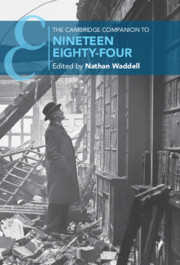Book contents
- The Cambridge Companion to Nineteen Eighty-Four
- The Cambridge Companion to Nineteen Eighty-Four
- Copyright page
- Contents
- Figures
- Contributors
- Acknowledgements
- Chronology
- Abbreviations
- Introduction
- Part I Contexts
- Part II Histories
- 5 Nineteen Eighty-Four and the Tradition of Satire
- 6 Orwell’s Literary Context: Modernism, Language, and Politics
- 7 Wells, Orwell, and the Dictator
- 8 Orwell’s Literary Inheritors, 1950–2000 and Beyond
- Part III Questions
- Part IV Media
- Further Reading
- Index
- Cambridge Companions to …
6 - Orwell’s Literary Context: Modernism, Language, and Politics
from Part II - Histories
Published online by Cambridge University Press: 18 September 2020
- The Cambridge Companion to Nineteen Eighty-Four
- The Cambridge Companion to Nineteen Eighty-Four
- Copyright page
- Contents
- Figures
- Contributors
- Acknowledgements
- Chronology
- Abbreviations
- Introduction
- Part I Contexts
- Part II Histories
- 5 Nineteen Eighty-Four and the Tradition of Satire
- 6 Orwell’s Literary Context: Modernism, Language, and Politics
- 7 Wells, Orwell, and the Dictator
- 8 Orwell’s Literary Inheritors, 1950–2000 and Beyond
- Part III Questions
- Part IV Media
- Further Reading
- Index
- Cambridge Companions to …
Summary
This chapter argues that we should take seriously Orwell’s claim, in his 1946 essay ‘Why I Write’, that ‘what I have most wanted to do throughout the past ten years is to make political writing into an art’. By examining how this ambition of yoking art to politics plays out in Orwell’s final novel, it places Nineteen Eighty-Four within the context of the literary problems and practices of Orwell’s precursors and contemporaries. First, it considers his relationship with literary modernism and its legacies, with particular reference to his analysis of the work of James Joyce and Henry Miller, for instance in the 1940 essay ‘Inside the Whale’. Next, it examines Nineteen Eighty-Four in the light of earlier dystopian and speculative fiction by William Morris, Aldous Huxley, E. M. Forster, Jack London, Katharine Burdekin, Storm Jameson, and others; it also considers the influence on Orwell of Arthur Koestler’s Darkness at Noon. Finally, it assesses depictions of writing and the politics of language within the novel, and how their treatment might relate to Orwell’s sense of his place within twentieth-century literature.
Keywords
- Type
- Chapter
- Information
- The Cambridge Companion to Nineteen Eighty-Four , pp. 95 - 108Publisher: Cambridge University PressPrint publication year: 2020
- 1
- Cited by

